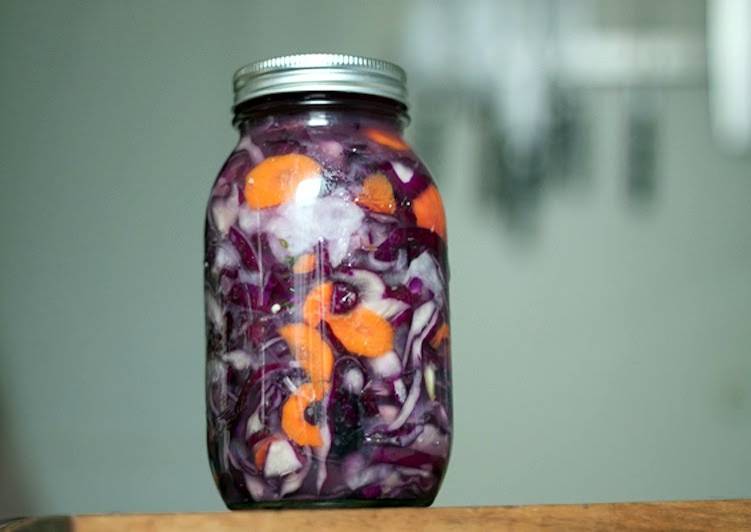Kimchi. Kimchi (/ ˈ k ɪ m tʃ iː /; Korean: 김치, romanized: gimchi, IPA: ), a staple in Korean cuisine, is a traditional side dish of salted and fermented vegetables, such as napa cabbage and Korean radish, made with a widely varying selection of seasonings including gochugaru (chili powder), spring onions, garlic, ginger, and jeotgal (salted seafood), etc. It is also used in a variety of soups. Mak kimchi, or simple kimchi, is made with cut cabbage, radish, and scallions and a seasoned paste of red pepper, garlic, ginger, sugar, and fish sauce, salted shrimp, or kelp powder. (Image credit: Apartment Therapy) Kimchi is a fermented dish, the more it ages the better it tastes, likewise with the sugar.
 Kimchi is a Korean side dish made from salted, seasoned, and fermented vegetables—most commonly Napa cabbage with radishes, green onions, and gochugaru, or red pepper flakes.
It is commonly found in many Asian restaurants.
Baechu-kimchi, or cabbage kimchi, is the most common type of kimchi.
You can cook Kimchi using 7 ingredients and 19 steps. Here is how you cook that.
Kimchi is a Korean side dish made from salted, seasoned, and fermented vegetables—most commonly Napa cabbage with radishes, green onions, and gochugaru, or red pepper flakes.
It is commonly found in many Asian restaurants.
Baechu-kimchi, or cabbage kimchi, is the most common type of kimchi.
You can cook Kimchi using 7 ingredients and 19 steps. Here is how you cook that.
Ingredients of Kimchi
- It's 3 lb of Red cabbage.
- You need 3/4 lb of Daikon radish.
- It's 1/2 lb of Yellow onion.
- It's 5 of to 10 cloves Garlic.
- Prepare 1/2 lb of Carrots.
- You need 2 of to 6 Thai Chilis.
- It's 2 tbsp of Kosher Salt or Sea Salt.
Kimchi, the national food of South Korea, is a spicy pickled vegetable dish. Kimchi is traditionally made by combining cabbage, scallions, or radishes in a brine with garlic, ginger, chili pepper,. Mix the kimchi well and pack it into hard plastic or glass containers. Pour in enough of the brine to cover the vegetables.
Kimchi step by step
- Start by slicing the red cabbage in half, then quarters, so it'll be easier to work with..
- Slice all of the cabbage into strips about 1/4" thick. Put the cabbage into a bowl and set it aside..
- Slice all the daikon radish into thin coins. We slice everything super thinly to create as much surface area as possible! This will make it easier for the salt to do its work. The thicker it is, the longer it'll take to ferment..
- Add the radish to the same bowl as the cabbage..
- Trim and peel all of the onion. Thinly slice the onion and add it to the bowl..
- Peel all of the carrot..
- Now slice the carrot into thin coins and add it to the bowl..
- Peel 5-10 cloves of garlic, depending on how strong you like it, and smash the cloves..
- Add the garlic to the other vegetables in the bowl..
- Mince 2-6 Thai chilis into a fine paste. You'll start by cutting them into small slices then going over it all again with your knife to mince it even more finely..
- Add the chili to the bowl..
- It's time to mash those vegetables. Add 1/8 cup of salt (that's 2 tbsp) to the vegetables..
- Use your hands to squeeze and mash the vegetables and salt. Continue to do this until the vegetables start to leach water..
- Once water has leached out of the vegetables, set the bowl aside for 30 minutes. This will allow the salt to draw more water out of the vegetables. Clean up and relax!.
- After the 30 minutes are up, tightly pack the vegetables into your 1 quart mason jar. Make sure there is enough liquid in the jar so that the vegetables are submerged..
- Put the lid on the jar and place it on your kitchen counter. Leave it at room temperature for at least 7 days. The bacteria need to be at room temperature to multiply and ferment..
- At least once a day, slowly open the lid to release the gases that build up. Hold your jar in the sink when doing this, for it’s sure to spray! Be sure to taste the ferment periodically. Once it tastes right to you, put it in your fridge..
- If the water level of the ferment drops below the vegetables, just add more of the mixture if you have any left over. If not, just add more water along with a pinch of salt, until the vegetables are submerged..
- Be sure to take a before and after picture of your kimchi. Watch it change color over time - it's a fascinating process. Post it on Twitter or Instagram with the hashtag #fermentfeast and we'll share it on the website..
Cover the containers and leave out at room temperature (but not more than. Kimchi is a classic Korean dish consisting of fermented cabbage and radish. Its tasty, spicy flavor makes it an ideal additional to rice, noodles, soup, and other dishes that need a little something extra. You can purchase prepared kimchi at Korean or Asian grocery stores, but it's actually relatively easy to make at home. Kimchi is a traditional Korean dish made with salted, fermented vegetables.